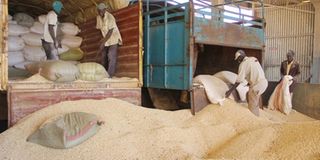Apply for relief food, NCPB boss tells famine-hit regions

Workers at the National Cereals and Produce Board Eldoret depot offload maize delivered by farmers on January 23, 2014. The cereals board has suspended maize buying, sparking protests from farmers in the North Rift. PHOTO | FILE |
What you need to know:
- Sh2.7 billion issued through the Ministry of Agriculture to buy maize from farmers has helped the board replenish NCPB's reserves
- The initiative aims at helping farmers minimise loss through proper packaging and application of insecticides.
Counties ravaged by famine should apply for relief food as Kenya has enough stock to last over three years, says National Cereals and Produce Board chairman Geoffrey King’ang’i.
He added that Sh2.7 billion issued through the Ministry of Agriculture to buy maize from farmers had helped the board replenish its reserves, which could deal with the food scarcity being experienced in various regions.
Speaking in Kiambere area of the semi-arid Mbeere South sub-county — which has suffered crop failure for three subsequent seasons — Mr King’ang’i said it was the role of the county and the national governments to make known their needs so that they could be assisted.
“This area has experienced crop failure and residents will suffer from food scarcity. It is the role of national and county governments to give information on famine situations,” he said.
The official said the board had introduced a programme with county governments to buy and store food in NCPB stores to ease famine situations.
The board is purchasing a 90kg bag of maize at Sh2,800, he noted.
“We have know-how on post-harvest management and can store food for long periods. We are ready to work with county governments to realise food security,” he said.
PROPER STORAGE
He added that although the country had enough food, most of it could be ruined if it was not stored properly.
The NCPB boss urged farmers to embrace the warehouse receipt service programme where the board stores food for farmers at low prices and helps them sell the same later when the returns are good.
The initiative aims at helping farmers minimise loss through proper packaging and application of insecticides.
“The warehouse receipt programme will take us to the future. It is embraced in developed countries as it ensures food security. It is like a bank; you store your grain and it is safe,” he said.
“Usually, the country harvests enough food but most of it is lost due to poor post-harvest management and aflatoxin attack, which causes cancers.
NCPB is offering guidance on how to properly preserve food for future use,” said Mr King’ang’i.





